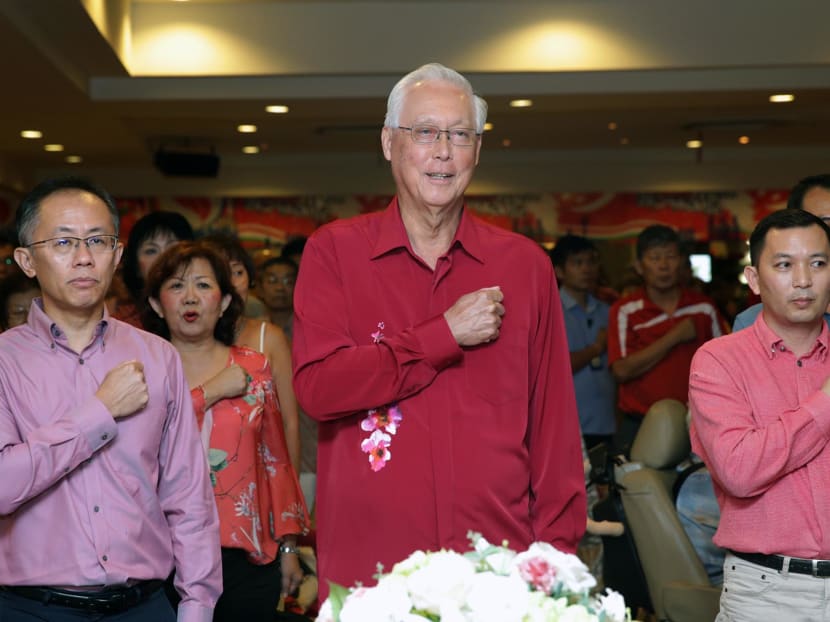A ‘stronger and more inclusive’ leadership team needed for S’pore: ESM Goh
SINGAPORE — Emeritus Senior Minister Goh Chok Tong on Saturday (Aug 19) called on “highly competent” Singaporeans outside the Government to step up and serve, as he stressed the need for a “stronger and more inclusive millennial generation team” to tackle future challenges.

ESM Goh Chok Tong at the Marine Parade constituency’s National Day Dinner. Photo: Wee Teck Hian/TODAY
SINGAPORE — Emeritus Senior Minister Goh Chok Tong on Saturday (Aug 19) called on “highly competent” Singaporeans outside the Government to step up and serve, as he stressed the need for a “stronger and more inclusive millennial generation team” to tackle future challenges.
Speaking at his Marine Parade constituency’s National Day Dinner, he said the next generation of government leaders “must try their utmost” to bring in potential office-holders from outside the Singapore Armed Forces and public sector to avoid group think.
Noting that Prime Minister Lee Hsien Loong, 65, has said that he would step down by 70, Mr Goh said the fourth generation leaders will have to “quickly establish themselves as a cohesive team, and identify the captain among them”.
He added: “The competence of the 4G leaders will be fully tested. But beyond technical competence, it is values that will hold our society together. Singaporeans will want to know what they stand for, what kind of Singapore they want to build and what they will pass on to the fifth generation later.”
He noted that the 4G leadership team, who are members of the Future Economy Council, is grappling with longer term challenges. “They will have to build a stronger and more inclusive millennial generation team,” Mr Goh said.
The council oversees skills and innovation efforts, and is headed by Finance Minister Heng Swee Keat.
Mr Heng is working with Trade and Industry (Industry) Minister S Iswaran, labour chief Chan Chun Sing, Minister for Education (Higher Education and Skills) Ong Ye Kung, Minister for National Development and Second Minister for Finance Lawrence Wong, and other ministers and ministers of state - especially the younger ones.
Mr Goh also spoke about “maintaining the resilience” of Singapore’s politics. “Our politics must be bold, forward looking and inclusive of all races and different political opinions. It must be resilient,” he said. He reiterated that Singapore is stable because it has successively elected a strong government, enabling the government to plan for the long term and prepare for contingencies.
Citing the examples of the Group Representation Constituency, Non-Constituency Members of Parliament (NCMPs) and Nominated MPs schemes, Mr Goh described these as “unique Singapore-style innovations to build political stabilisers to a free-wheeling democratic process”.
“We adapted the Westminster system of parliamentary democracy to our local conditions,” he said.
Similarly, the Elected Presidency serves as a check against a populist and profligate government, he reiterated. Referring to the recent Constitutional amendments to set aside reserved elections for minorities, Mr Goh said this was “another stabiliser to ensure our multi-racial society stays afloat”.
Singapore will hold its inaugural reserved Presidential Election next month for Malay candidates.
“If these stabilisers are not introduced to our political system, our democratic state risks being capsized when buffeted by internal differences and divisions, let alone external storms,” Mr Goh noted.
The robustness of Singapore’s leadership pipeline, the resilience of its politics, and the cohesiveness of the country’s multi-racialism and social equity will determine how “a small boat like Singapore fare in its journey ahead” amid the turbulent external environment, Mr Goh said.
“Externally, the decades of regional stability may come to an end,” he warned.
Domestically, Singapore will find it much harder to climb up another rung of success. “Just look at the mountaineers scaling the peak of Mount Everest. At that height, the air is thinner and dangers lurk,” he said.
The Republic has reversed its economic situation compared to the “precarious” circumstances in 1965 when it gained independence, Mr Goh noted. This was achieved because each generation worked and sacrificed for the next generation. Singapore must maintain this virtuous circle, he said. “The question is ‘how’,” he added.
Mr Goh also called on Singapore to guard against social inequity becoming the new fault line.
He noted that for a new country, meritocracy has produced the desired results, with the brightest, ablest and most hardworking rising to the top. However, meritocracy subsequently “entrenches the successful, widens the income gap and creates a sense of social inequity”.
“The children of well-to-do families are sent to expensive kindergartens and private tuition,” Mr Goh pointed out. “They are invested with extra learning and social skills from the day they are born. They inherit the intangible gift of good family backgrounds and networks.”
Hence, the State should intervene to ensure that the meritocratic process serves its purpose just as it had done so for the political system, Mr Goh said.
To this end, the Government is heavily subsidising housing, health care and education, and there were recent measures to “soften the focus on academic grades and re-skill Singaporeans to take on higher value jobs”. These policies have gone some way to narrow the income divide, he said.
While the stratification of society is a “deep problem” everywhere, the Government is “expending immense resources to make Singapore more fair and equal, while guarding against the downsides of a generous welfare state”.
He noted that Mr Lee’s emphasis on early childhood development programmes was “addressing the problem at its roots”.
But he added: “The 4G leaders must find their own robust language, political values and programmes to lift the lives of lower-income Singaporeans.”
Mr Goh stressed that the fourth generation leaders will have to build their own social compact with the people. “They have their work cut out for them. But they will inherit a political system in good working order. They will have to bequeath a fair and multi-racial society to the generation after them,” he said.






